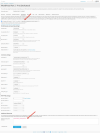Hello everyone,
I am currently trying to understand 2 things in Plesk, or web hosting in general:
Opcache in combination with
PHP-FPM and PHP-FPM Dedicated
(I know there are handlers for PHP-FPM Apache and nginx, but this is not relevant for my question, I guess)
I already found some threads about those topics here at the Plesk forum, like this one and this linked guide, but they are confusing me even more.
So, here is what I found out so far (or what, I believe, is correct. Please correct me if I'm wrong)

If my assumptions above are correct, then my questions are:
Thanks in advance for your help!
I am currently trying to understand 2 things in Plesk, or web hosting in general:
Opcache in combination with
PHP-FPM and PHP-FPM Dedicated
(I know there are handlers for PHP-FPM Apache and nginx, but this is not relevant for my question, I guess)
I already found some threads about those topics here at the Plesk forum, like this one and this linked guide, but they are confusing me even more.
So, here is what I found out so far (or what, I believe, is correct. Please correct me if I'm wrong)
- PHP-FPM and Dedicated use the same technology, and FPM is currently recommended because it is a more advanced Fast-CGI handler (here)
- PHP-FPM Dedicated is more stable & faster because it spawns its process, but also needs slightly more resource than non-dedicated FPM
- Opcache values specified in the "Additional configuration directives" for Plans/Subscriptions using PHP-FPM dedicated should work because they are using their own PHP-Handler and therefore have a dedicated opcache memory:

If my assumptions above are correct, then my questions are:
- How do I specify the opcache memory size for the non-dedicated PHP-FPM handlers? Is this php.ini or this 10-opcache file the correct one?
- Are the non-dedicated ones sharing/using the same opcache memory pool?
- If yes: Is there any way to make sure every non-dedicated PHP-FPM subscription is getting its chunk of memory, i.e. by specifying a memory limit in the Additional configuration directives?
Thanks in advance for your help!
